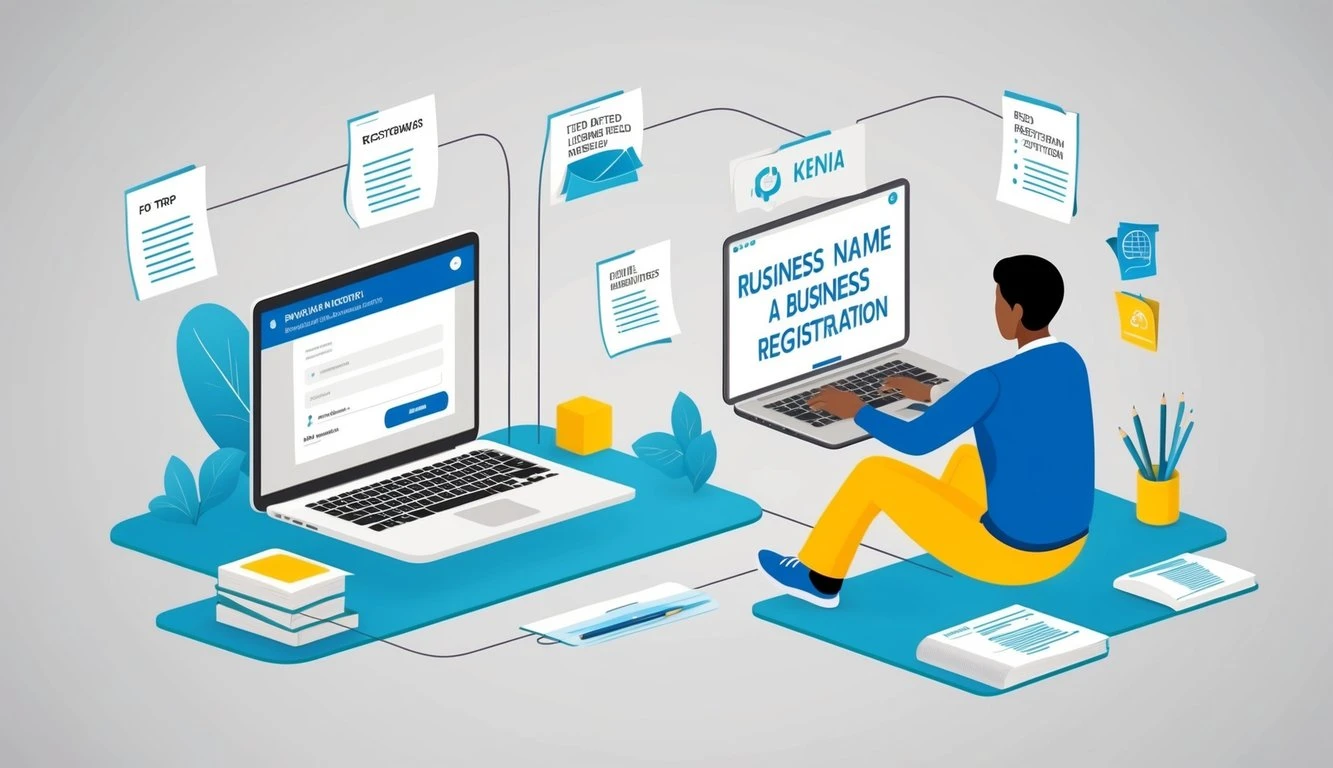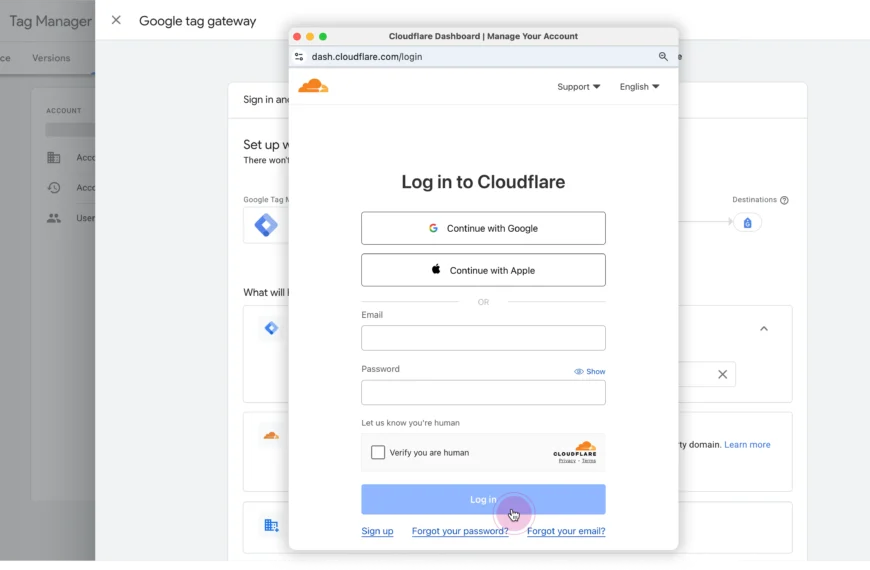Last updated on May 6th, 2025 at 03:45 pm
Thinking about starting your own business in Kenya? Not sure where to begin?
Starting a small business here can feel like a lot, with so many steps to figure out.
Knowing what matters most when starting a small business in Kenya sets you up for success and helps you avoid common mistakes.
This guide gives you practical tips based on the local business environment and real experiences.
You’ll see which actions matter most as you plan your small business journey. Let’s move from idea to opening your doors with a bit more confidence.
1) Register a unique business name with the Business Registration Service (BRS)

Choosing a unique business name is your first step. Make sure it stands out, is easy to remember, and actually fits what you do.
You’ll need to register your business name through the Business Registration Service (BRS).
The eCitizen portal handles this online, and honestly, it’s pretty straightforward.
Start by searching for your business name to check if it’s available. BRS will do a check to avoid any duplicates.
Once the name is approved, fill out the online registration forms with your details. Registering your business name helps build trust with customers and makes things like business banking much easier.
2) Draft a detailed and realistic business plan
A solid business should clearly show what your business does, who your customers are, and what you hope to achieve.
A basic business plan covers your idea, the products or services you’ll offer, and a short description of your target market.
Include your location, needed equipment, and main costs.
Budgeting is key. List your start-up costs, daily expenses, and expected income. Don’t forget licenses, rent, salaries, and supplies.
If you’re not sure where to begin, sample business plan templates can help. Keep your plan simple and realistic—it’ll help you make better decisions and get support from others.
3) Secure adequate startup capital or funding
Getting enough money to start your small business in Kenya matters a lot. You’ll need funds for inventory, marketing, licenses, and rent.
Start by checking how much you already have—maybe from savings or help from friends and family.
If that’s not enough, consider other options.
Banks in Kenya offer business loans, but you’ll need a strong business plan to qualify. Microfinance institutions and mobile loan services can help if you need smaller amounts.
For bigger ideas, venture capital or angel investors might be interested. Some local and international investors look for Kenyan businesses with growth potential.
Crowdfunding lets you share your business story online and ask people to support you. You could also look at other funding sources or mix different methods if needed.
4) Obtain all necessary business permits and licenses
You need the right permits before you open your doors. It’s not just a box to tick—skipping it can get you fined or even shut down, especially if you are a foreigner.
Find out which permits and licenses fit your business. Requirements change depending on what you’re doing—for example, food businesses need health permits, while a retail shop needs a single business permit.
You can usually apply for a single business permit from your county government. Fill out the forms and pay the fees.
If you deal with special goods like medicine or alcohol, you’ll need extra permits. Check with the authorities or visit government offices to make sure you don’t miss anything.
Having your permits shows your business is legal and professional.
5) Comply with Kenya’s tax obligations
You want to get familiar with your tax obligations as a business owner in Kenya.
The law requires all businesses to follow tax rules, and ignoring them can get you in trouble.
Register for taxes with the KRA. You do this online and get a Personal Identification Number (PIN) for business transactions.
Kenyan businesses pay different taxes—income tax, VAT, and sometimes excise duty. Find out which ones apply to you.
Keep accurate records of sales, purchases, and expenses. This makes filing tax returns much less stressful.
Most filing and payments happen through the iTax portal. Stick to the deadlines to stay in good standing. If taxes confuse you, it’s smart to get help from a certified tax professional, especially when your small business start showing potential of huge growth.
6) Choose the appropriate legal business structure
Picking the right legal structure matters. It affects your taxes, risk, and paperwork.
You can register as a sole proprietorship, partnership, or limited company. Sole proprietorships are simple and cheap, but you carry all the risk.
Partnerships let you share control, profits, and risks with others. It’s a good option if you’re not going solo.
Limited companies give your business its own legal identity, so your personal assets are safer. Setup takes more effort and money, but you get better protection.
Think about your goals, how many owners you’ll have, and your appetite for risk.
7) Conduct thorough market research for your product or service
Before putting in your money or time, make sure your idea has a shot.
Market research means finding out what your target customers want and what your competitors are up to.
Start by talking to potential customers. Simple surveys, social media polls, or just asking questions face-to-face can teach you a lot.
Look at businesses already selling similar things. Check out their prices, what they offer, and what customers say about them.
Online research and public data help, too.
Set clear goals for your market research. Try to figure out why people might pick your product over others.
Spotting gaps in the market gives your business a better shot.
8) Develop a clear marketing and sales strategy
Your small business needs a practical plan for finding customers and making sales.
A good marketing and sales strategy helps you get noticed in a crowded market.
Start by figuring out who your customers are. Think about their age, interests, where they live, and how they spend.
Pick marketing channels that suit your audience.
Social media, word of mouth, flyers, influencer marketing, TikTok Ads, and local events all work well for small businesses.
Set up a simple website to show your products and share your contact details. Even a small marketing budget can make a difference if you use it wisely.
Keep an eye on what works by tracking sales and asking customers how they found you.
Adjust your approach as you learn what brings in the most business.
9) Leverage digital marketing and social media platforms
Promoting your local business gets a lot easier when you tap into digital marketing and social media platforms.
Pretty much everyone’s glued to their phones these days, so your business can reach way more people online than you ever could just by talking to folks face-to-face.
Start by setting up business profiles on popular social sites like Facebook, Instagram, and LinkedIn. Post updates, share photos, and reply to customers quickly—people notice when you actually talk back.
Mix things up with useful or fun posts, pictures, or quick videos. Keep your branding and contact info fresh so no one gets lost.
Try scheduling your posts ahead of time to stay active without having to post manually every. Single. day!
There are tools that make this a breeze, honestly.
- Publer
- Buffer
- Hootsuite
Figure out what you want from your online efforts—more sales, website visits, or just more followers?
Setting clear goals helps you focus and see what’s actually working.
Simple search engine tricks and local ads can help more people discover your business, too.
10) Automate business operations where possible to save time
Running a business eats up hours fast. If you automate routine stuff, you’ll have more time for the big-picture things.
Use accounting software for tracking expenses and sending invoices. These tools cut down on mistakes and keep your records tidy.
Inventory or sales software helps you know what’s in stock and what needs reordering.
It’s way better than guessing.
Set up automated customer messages or payment reminders so you can reply fast and collect payments on time. It’s a small change that saves headaches later.
Even simple automation ideas—like using apps for stock control, payroll, or processing orders—can really help.
There are plenty of easy options built for small businesses.
11) Build a strong network by talking to experienced entrepreneurs
Building a network matters a lot in the world of business.
Chatting with experienced entrepreneurs gives you real-world advice and helps you dodge the usual beginner mistakes.
When you reach out, ask what worked for them and what tripped them up. Most business owners will share tips if you respect their time and show up with good questions.
Go to business events and seminars in your area to meet people face-to-face. After you meet someone, keep in touch using WhatsApp or LinkedIn.
Joining local business groups or online communities is another way to learn from others. Focus on building real relationships, not just asking for favors all the time.
If you help others and stay involved, your network will grow and you’ll find people you can actually trust.
12) Hire skilled employees and ensure proper training
Hiring skilled employees is key for any kind of business.
You want staff who know their jobs and can actually deliver good work.
For certain businesses, like opening a chemist, you’ll need at least one licensed professional—like a pharmacist — to meet legal rules.
Once you hire people, give them regular training. Even a quick workshop or short course can help your team stay sharp and keep up with new business trends.
Encourage open chats about training needs. Ask your staff what would help them do better, and actually listen to their feedback.
If you keep your team well-trained, your business is way more likely to succeed in Kenya.
13) Consider location and accessibility for your target customers
Your business location really affects how easily customers can find and reach you. Being close to your target crowd saves them time and brings in more walk-ins.
If you’re opening a shop, look for spots where lots of potential buyers already hang out.
Makes sense, right?
Pick an area that’s safe, has decent roads, and is easy to reach by public transport. A well-connected location means more walk-ins and smoother deliveries.
Make sure you have enough space for now and a little extra for when you grow. It’s smart to compare rent and double-check you can afford it before signing anything.
Legal Requirements for Small Businesses in Kenya
Starting a small business in Kenya means handling a few legal steps that are simple but can’t be skipped.
Miss one, and you might get fined or have your plans delayed.
You’ll need the right paperwork to run legally and steer clear of tax trouble. By following the requirements, you set your business up for success and avoid ugly surprises from the authorities.
Business Registration Processes
To run a small business in Kenya legally, you’ll need to register it first. Most people start on the eCitizen portal.
You’ve got a few choices for business structure:
- Sole Proprietorship: Perfect if you’re going solo. It’s quick and cheap to set up.
- Partnership: Good if you want to team up with others.
- Limited Company: Useful if you want a more formal setup or plan to raise money later.
To register, you’ll need your name, ID, contact info, and address. For companies, bring a copy of your Memorandum and Articles of Association.
Registration fees depend on your business type, with sole proprietorships being the cheapest.
Once you’re done, you’ll get a certificate to prove you’re legit.
This certificate lets you open a business bank account and apply for the licenses you need. Some businesses need extra permits, like health or food handling certificates, depending on what you do.
Tax Obligations and Compliance
After registration, you’ve got to handle your tax duties.
The Kenya Revenue Authority (KRA) gives every business a Personal Identification Number (PIN).
You’ll need this PIN for taxes, opening a bank account, and even some contracts. Register for the right taxes, too.
Small businesses usually deal with:
- Income tax on profits
- Value Added Tax (VAT) if your sales go over a certain limit
- Pay As You Earn (PAYE) if you hire employees
File tax returns every year, even if you didn’t make much. Missed filings or late payments usually get you a penalty.
Keep accurate records of sales and expenses, so you can file returns and show proof if there’s an audit.
You may also need to register your workers with the SHIF (Formerly NHIF) and National Social Security Fund (NSSF).
Growth and Sustainability Strategies
By now you know you will need more than just the perfect idea to run a sustainable business.
You’ll need strategy and execution.
Building the right relationships and using digital tools can really take your business up a notch.
Building Local Partnerships
Strong partnerships open doors to local markets, affordable supplies, and real support.
Reach out to other small businesses, community groups, and local suppliers. It’s easier to get good deals and build trust when you know people in your network.
Shops in Kenya that build these networks often get new customers through word of mouth and joint promos.
Here’s what you can do:
- Go to local trade events and meet other business owners.
- Share resources like delivery or advertising.
- Team up on offers—maybe bundle your products with someone else’s.
Keep partnerships alive with regular check-ins. Set ground rules so everyone’s clear.
Leveraging Digital Platforms
Using digital platforms helps you reach new customers and improve service.
These days, most Kenyans use mobile phones and get services online, so digital marketing matters more than ever.
Set up a Facebook or Instagram page for your business. You can share updates, photos, and special offers there.
A business website builds trust. It also makes it easier for customers to find you.
A simple but effective routine can include:
- Posting fresh content on social media at least twice a week.
- Using WhatsApp for Business to answer customer questions quickly.
- Collecting feedback through online surveys.
You might want to add an e-commerce option so customers can order or pay through your website or mobile money.
Investing in digital marketing can lead to more sales and better customer loyalty, honestly.
Keep an eye on which posts or promotions actually work. Focus on those and don’t be afraid to experiment a bit.
 Domain SearchInstantly check and register your preferred domain name
Domain SearchInstantly check and register your preferred domain name Web Hosting
Web Hosting cPanel HostingHosting powered by cPanel (Most user friendly)
cPanel HostingHosting powered by cPanel (Most user friendly) KE Domains
KE Domains Reseller HostingStart your own hosting business without tech hustles
Reseller HostingStart your own hosting business without tech hustles Windows HostingOptimized for Windows-based applications and sites.
Windows HostingOptimized for Windows-based applications and sites. Free Domain
Free Domain Affiliate ProgramEarn commissions by referring customers to our platforms
Affiliate ProgramEarn commissions by referring customers to our platforms Free HostingTest our SSD Hosting for free, for life (1GB storage)
Free HostingTest our SSD Hosting for free, for life (1GB storage) Domain TransferMove your domain to us with zero downtime and full control
Domain TransferMove your domain to us with zero downtime and full control All DomainsBrowse and register domain extensions from around the world
All DomainsBrowse and register domain extensions from around the world .Com Domain
.Com Domain WhoisLook up domain ownership, expiry dates, and registrar information
WhoisLook up domain ownership, expiry dates, and registrar information VPS Hosting
VPS Hosting Managed VPSNon techy? Opt for fully managed VPS server
Managed VPSNon techy? Opt for fully managed VPS server Dedicated ServersEnjoy unmatched power and control with your own physical server.
Dedicated ServersEnjoy unmatched power and control with your own physical server. SupportOur support guides cover everything you need to know about our services
SupportOur support guides cover everything you need to know about our services








